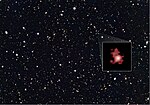| Discovery | |
|---|---|
| Discovered by | C. S. Shoemaker |
| Discovery site | Palomar Obs. |
| Discovery date | 28 November 1994 |
| Designations | |
| MPC designation | 1994 WR12 |
| Minor planet category | NEO · Aten |
| Orbital characteristics | |
| Epoch 2022-Jan-21 (JD 2459600.5) | |
| Uncertainty parameter 0 | |
| Observation arc | 27.01 yr (9,864 d) |
| Aphelion | 1.0577 AU (158.23 million km) |
| Perihelion | 0.4562 AU (68.25 million km) |
| Semi-major axis | 0.7570 AU (113.25 million km) |
| Eccentricity | 0.39735 |
| Orbital period (sidereal) | 240.6 days (0.659 yr) |
| Mean anomaly | 217.06° |
| Mean motion | 1° 29 45.96 / day |
| Inclination | 6.8515° |
| Longitude of ascending node | 62.608° |
| Argument of perihelion | 206.03° |
| Earth MOID | 0.0018 AU (0.70 LD) |
| Physical characteristics | |
| Mean diameter | 130 m (est.) 92 – 210 m (CNEOS) |
| Mass | 2.9×10 kg (est.) |
| Absolute magnitude (H) | 22.3 |
1994 WR12 is an asteroid and near-Earth object approximately 130 meters (430 feet) in diameter. As a member of the Aten group almost all of its orbit is closer to the Sun than Earth is. On 24 November 1994 it passed about 374100 km from the Moon. First imaged at Kitami Observatory on 26 November 1994, it was discovered two nights later by American astronomer Carolyn S. Shoemaker at Palomar Observatory on 28 November 1994. The asteroid then went unobserved from 1994 until it was recovered by Mauna Kea in March 2016. It was removed from the Sentry Risk Table on 2 April 2016.
| Date | JPL SBDB nominal geocentric distance |
uncertainty region (3-sigma) |
|---|---|---|
| 2021-11-29 | 6152189 km | ± 34 km |
| 2046-11-25 | 1633719 km | ± 4133 km |
| 2190-11-23 | 135000000 km | ± 815 million km |
Description
1994 WR12 orbits the Sun at a distance of 0.5–1.1 AU once every 8 months (240 days). Its orbit has an eccentricity of 0.40 and an inclination of 7° with respect to the ecliptic.
It has an Earth minimum orbital intersection distance of 0.0018 AU (269,000 km), which translates into 0.7 lunar distances. On 25 November 2046, it will pass 1633719 km from Earth with an uncertainty of ±4133 km. While listed on the Sentry Risk Table the range for the 2046 close approach distance varied from 0.001 AU (150,000 km) to 0.039 AU (5,800,000 km) from Earth.
While listed on the Sentry Risk Table, virtual clones of the asteroid that fit the uncertainty in the known trajectory showed 116 potential impacts between 2054 and 2109. It had about a cumulative 1 in 9090 chance of impacting the Earth. The formerly poorly known trajectory of this asteroid was further complicated by close approaches to Venus and Mercury. It was recovered by Mauna Kea in March 2016, which extended the observation arc from 34 days to 21 years.
It is estimated that an impact would produce the equivalent of 77 megatons of TNT, roughly 1.5 times that of most powerful nuclear weapon ever detonated (Tsar Bomba).
It has too a unique characteristic: it's complanar with Mercury, it can to be a fragment thrown away by an asteroid impact on Mercury, it's very little MOID with the Earth can produce a meteor shower on Earth and if the meteoroids were large enough even Mercurian meteorites.
See also
References
- ^ "1994 WR12". Minor Planet Center. Retrieved 30 June 2020.
- ^ "MPEC 1994-Y05 : 1994 WR12". IAU Minor Planet Center. 21 December 1994. Retrieved 17 October 2011. (J94W12R)
- ^ "JPL Small-Body Database Browser: (1994 WR12)" (2022-01-25 last obs.). Jet Propulsion Laboratory. Archived from the original on 30 November 2017. Retrieved 29 November 2021.
- ^ "Archive: Earth Impact Risk Summary: 1994 WR12". NASA/JPL Near-Earth Object Program Office. 26 March 2016. Archived from the original on 26 March 2016.
- "Removed Objects". NASA/JPL Near-Earth Object Program Office.
- "Horizons Batch for 2021-Nov-29 06:05 UT". JPL Horizons. Archived from the original on 19 November 2021. Retrieved 28 November 2021.
- "Horizons Batch for 2190-Nov-23 22:27 UT". JPL Horizons. Archived from the original on 20 November 2021. Retrieved 29 November 2021.
- "JPL Close-Approach Data: (1994 WR12)". Retrieved 29 November 2021.
"(1994 WR12)". Archived from the original on 13 December 2012. Retrieved 29 January 2018. (last observation: 1994-12-31; arc: 35 days; Uncertainty: 8) - "Archive: Sentry Risk Table". NASA/JPL Near-Earth Object Program Office. 29 May 2013. Archived from the original on 29 May 2013.
External links
- List Of Aten Minor Planets (by designation), Minor Planet Center
- 1994 WR12 at NeoDyS-2, Near Earth Objects—Dynamic Site
- 1994 WR12 at ESA–space situational awareness
- 1994 WR12 at the JPL Small-Body Database

| 2016 in space | ||
|---|---|---|
| Space probe launches |
|    |
| Impact events | ||
| Selected NEOs | ||
| Exoplanets |
| |
| Discoveries |
| |
| Novae | ||
| Comets | ||
| Space exploration | ||
| Planetary defense | |
|---|---|
| Main topics | |
| Defense | |
| Space probes | |
| NEO tracking | |
| Organizations | |
| Potential threats | |
| Related categories | |
| Small Solar System bodies | |||||||
|---|---|---|---|---|---|---|---|
| Minor planets |
| ||||||
| Comets | |||||||
| Other | |||||||